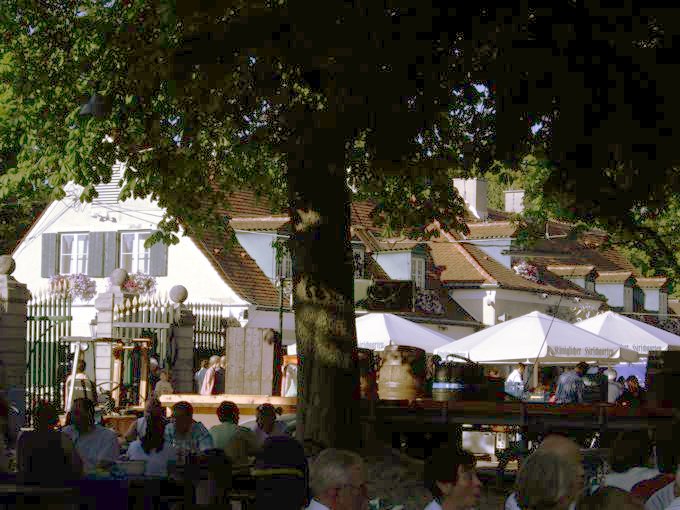|
Hirschgarten
The Hirschgarten, formally the Königlicher Hirschgarten, is a restaurant in Munich. The restaurant is noted for its beer garden A beer garden (German: ''Biergarten'') is an outdoor area in which beer and food are served, typically at shared tables shaded by trees. Beer gardens originated in Bavaria, of which Munich is the capital city, in the 19th century, and remain co .... It has seating for over 8000 people. The restaurant dates back to 1791. References External links The Hirschgarten's English home page German beer culture Restaurants in Germany Food and drink companies based in Munich {{beer-stub ... [...More Info...] [...Related Items...] OR: [Wikipedia] [Google] [Baidu] |
Beer Garden
A beer garden (German: ''Biergarten'') is an outdoor area in which beer and food are served, typically at shared tables shaded by trees. Beer gardens originated in Bavaria, of which Munich is the capital city, in the 19th century, and remain common in Southern Germany. They are usually attached to a brewery, beer hall, Public house, pub, or restaurant. History Facilities of this kind existed for example in Bamberg since 1605 under the German term :de:Bierkeller, "Bierkeller" ("Beer cellars"). At that time, the Roman Catholic Archdiocese of Bamberg, Archdiocese of Bamberg was directly subordinated to Rome and not yet to the Duchy of Bavaria. Hence, the first "Biergarten" in the strict sense of the term and of the decree of 1812 by the Kingdom of Bavaria developed at the beginning of 19th century in Munich. While it is unknown which brewery was first, it was likely one of Munich's big six: Löwenbräu, Hofbräuhaus, Augustinerbräu, Paulaner, Hacker-Pschorr and Spaten. Sea ... [...More Info...] [...Related Items...] OR: [Wikipedia] [Google] [Baidu] |
Munich
Munich is the capital and most populous city of Bavaria, Germany. As of 30 November 2024, its population was 1,604,384, making it the third-largest city in Germany after Berlin and Hamburg. Munich is the largest city in Germany that is not a state of its own. It ranks as the 11th-largest city in the European Union. The metropolitan area has around 3 million inhabitants, and the broader Munich Metropolitan Region is home to about 6.2 million people. It is the List of EU metropolitan regions by GDP#2021 ranking of top four German metropolitan regions, third largest metropolitan region by GDP in the European Union. Munich is located on the river Isar north of the Alps. It is the seat of the Upper Bavaria, Upper Bavarian administrative region. With 4,500 people per km2, Munich is Germany's most densely populated municipality. It is also the second-largest city in the Bavarian language, Bavarian dialect area after Vienna. The first record of Munich dates to 1158. The city ha ... [...More Info...] [...Related Items...] OR: [Wikipedia] [Google] [Baidu] |
German Beer Culture
German(s) may refer to: * Germany, the country of the Germans and German things **Germania (Roman era) * Germans, citizens of Germany, people of German ancestry, or native speakers of the German language ** For citizenship in Germany, see also German nationality law **Germanic peoples (Roman era) *German diaspora * German language * German cuisine, traditional foods of Germany People * German (given name) * German (surname) * Germán, a Spanish name Places * German (parish), Isle of Man * German, Albania, or Gërmej * German, Bulgaria * German, Iran * German, North Macedonia * German, New York, U.S. * Agios Germanos, Greece Other uses * German (mythology), a South Slavic mythological being * Germans (band), a Canadian rock band * "German" (song), a 2019 song by No Money Enterprise * ''The German'', a 2008 short film * "The Germans", an episode of ''Fawlty Towers'' * ''The German'', a nickname for Congolese rebel André Kisase Ngandu See also * Germanic (disambiguatio ... [...More Info...] [...Related Items...] OR: [Wikipedia] [Google] [Baidu] |
Restaurants In Germany
A restaurant is an establishment that prepares and serves food and drinks to customers. Meals are generally served and eaten on the premises, but many restaurants also offer take-out and food delivery services. Restaurants vary greatly in appearance and offerings, including a wide variety of cuisines and service models ranging from inexpensive fast-food restaurants and cafeterias to mid-priced family restaurants, to high-priced luxury establishments. Etymology The word derives from the early 19th century, taken from the French word 'provide meat for', literally 'restore to a former state' and, being the present participle of the verb, the term ''restaurant'' may have been used in 1507 as a "restorative beverage", and in correspondence in 1521 to mean 'that which restores the strength, a fortifying food or remedy'. History A public eating establishment similar to a restaurant is mentioned in a 512 BC record from Ancient Egypt. It served only one dish, a plate of cereal, wil ... [...More Info...] [...Related Items...] OR: [Wikipedia] [Google] [Baidu] |



